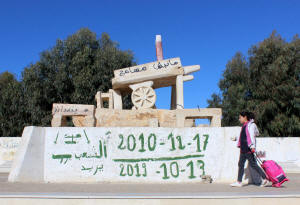Ten years on, anger grows in Tunisian town where 'Arab Spring' began
 Send a link to a friend
Send a link to a friend
 [December 15, 2020]
By Angus McDowall and Tarek Amara [December 15, 2020]
By Angus McDowall and Tarek Amara
SIDI BOUZID, Tunisia (Reuters) - Ten years
ago, a fruit seller set himself ablaze in the central Tunisian town of
Sidi Bouzid after an altercation with a policewoman about where he had
put his cart.
Word of Mohammed Bouazizi's fatal act of defiance quickly spread,
sparking nationwide protests that eventually toppled Tunisia's
long-serving leader and helped inspire similar uprisings across the
region - the so-called "Arab Spring".
Huge demonstrations broke out in Egypt and Bahrain, governments fell and
civil war engulfed Libya, Syria and Yemen.
Tunisians are now free to choose their leaders and can publicly
criticise the state. Yet for all the chaos they have been through, many
people look back on the events of 2010 and regret that their dreams
remain unfulfilled.
"Something went wrong in the revolution," said Attia Athmouni, a retired
philosophy teacher who helped lead the uprising after Bouazizi's death
by standing on the fruit seller's abandoned cart to address the crowd
the night he died.
Protests have flared again in recent weeks across Tunisia's poorer
southern towns against joblessness, poor state services, inequality and
shortages.
The scramble to get enough cooking gas to provide for families
underlines the hardships ordinary people face in a country where the
economy has stagnated, leaving the public as angry as it was a decade
ago.

Near Sidi Bouzid last week, a crowd placed large stones across the
tarmac to block a main road. They wanted trucks taking cooking gas
cylinders to the town to offload them in their village instead.
Supplies have been in short supply in Tunisia since people living near
the main state-run factory producing the gas closed the plant several
weeks ago to demand more local jobs.
Outside the main outlet for cooking gas in Sidi Bouzid, three riot
police vans guarded the gate as hundreds of people waited to get their
hands on full cylinders.
A woman at the front of the crowd said she had had no gas for three days
and her family had been eating only cold food. She had queued for six
and a half hours.
REVOLUTION
Bigger demonstrations may take place in Tunisia on Thursday, the
anniversary of Bouazizi's self-immolation after his fruit cart was
confiscated when he refused to move off an unlicensed pitch.
Slimane Rouissi, another Sidi Bouzid activist and former teacher who
knew Bouazizi's family, said the young man had endured a string of
disappointments before the final confrontation.
He drenched himself in petrol and killed himself in front of the local
governorate office.
When Athmouni, the retired teacher, heard about the incident, he
dismissed his class and told his students to start protesting.
That night, as hundreds of people gathered outside the governorate and
chanted slogans, he heard the words "the people want the fall of the
regime" - soon to be the catch phrase of Tunisia's revolution - for the
first time.
Over the coming weeks the protests grew. By January, 2011, thousands
were marching in Tunis and President Zine El-Abidine Ben Ali, in power
for 23 years, realised the game was up. He fled to Saudi Arabia where he
died in exile last year.
Tunisia's revolution spread. In Egypt the crowds forced Hosni Mubarak
from power after 30 years as president. Uprisings shook Libya, Syria,
Bahrain and Yemen.
Hope for a new democratic future soon turned to bloodshed, particularly
in Syria, Yemen and Libya, where civil wars pulled in major powers
fearful their regional foes would gain an advantage.
[to top of second column]
|

A girl walks past a memorial for Mohamed Bouazizi, a street vendor
who set himself alight 10 years ago on December 17, 2010, in Sidi
Bouzid, Tunisia December 8, 2020. Graffiti reads: "The people want".
Picture taken December 8, 2020. REUTERS/Angus McDowall

Though Tunisia's path to democracy has been far smoother, its
economy has deteriorated and political leaders appear paralysed.
Last year's election delivered a bitterly fragmented parliament
unable to produce a stable government, with parties bickering over
cabinet seats and putting off big decisions.
More Tunisians are trying illegally to leave the country than ever,
while visions of jihad lure alienated, jobless youth. Both dynamics
were evident in the recent attack in Nice by a young Tunisian
migrant who killed three people in a church.
"There is a rupture between the politicians and the people now
because the system cannot understand the demands of the street,"
Athmouni said bitterly in a Sidi Bouzid cafe full of unemployed
young men.
NO INVESTMENT
In the streets near Bouazizi's old home - a shabby single-storey
building behind a dented metal gate - a group of young men stood
chatting on a street corner.
Sabri Amri, 26, laughed when asked if he had voted in any of
Tunisia's post-revolution elections. All he and his group of friends
want is to emigrate, he said. There is no work and young people
spend their time drinking or taking drugs, he added.
"We have geniuses here - doctors, engineers. I know a guy who is a
mechanical engineer. What does he do now? He sells weed just to
live," said Abdullah Gammoudi, a qualified sports teacher who does
not have a job.
In Sidi Bouzid, the only tangible signs of investment since 2011 are
a new building outside town to replace the governorate headquarters
where Bouazizi died, and his memorial - a stone fruit cart scrawled
with graffiti saying: "The people want..."

Mohammed Bouali, 37, stood behind the government offices off Sidi
Bouzid's main road, his cart full of oranges, apples and bananas. He
and Bouazizi used to work on the same street.
Though his work - weighing out fruit for customers with a small
hand-held scale - does not make enough to support his two children,
he has few other options.
"The government won't provide anything," he said.
The policewoman who confiscated Bouazizi's cart 10 years ago still
patrols the same streets, moving unlicensed vendors from their
pitches.
Athmouni believes the answer is more protests. Mass uprisings in
Algeria and Sudan ousted entrenched leaders there only last year.
"I'm convinced the revolution is continuous," he said. "This year
the anger is bigger than in the past."
(Reporting by Angus McDowall; Editing by Mike Collett-White)
[© 2020 Thomson Reuters. All rights
reserved.] Copyright 2020 Reuters. All rights reserved. This material may not be published,
broadcast, rewritten or redistributed.
Thompson Reuters is solely responsible for this content. |